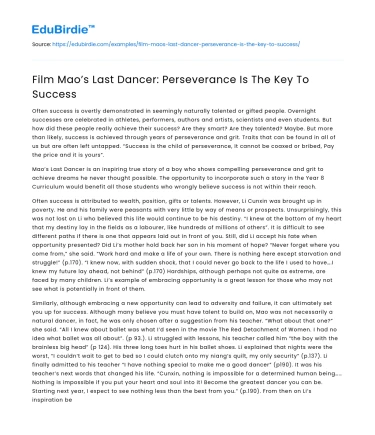Often success is overtly demonstrated in seemingly naturally talented or gifted people. Overnight successes are celebrated in athletes, performers, authors and artists, scientists and even students. But how did these people really achieve their success? Are they smart? Are they talented? Maybe. But more than likely, success is achieved through years of perseverance and grit. Traits that can be found in all of us but are often left untapped. “Success is the child of perseverance, It cannot be coaxed or bribed, Pay the price and it is yours”.
Mao’s Last Dancer is an inspiring true story of a boy who shows compelling perseverance and grit to achieve dreams he never thought possible. The opportunity to incorporate such a story in the Year 8 Curriculum would benefit all those students who wrongly believe success is not within their reach.
Save your time!
We can take care of your essay
- Proper editing and formatting
- Free revision, title page, and bibliography
- Flexible prices and money-back guarantee
Often success is attributed to wealth, position, gifts or talents. However, Li Cunxin was brought up in poverty. He and his family were peasants with very little by way of means or prospects. Unsurprisingly, this was not lost on Li who believed this life would continue to be his destiny. “I knew at the bottom of my heart that my destiny lay in the fields as a labourer, like hundreds of millions of others”. It is difficult to see different paths if there is one that appears laid out in front of you. Still, did Li accept his fate when opportunity presented? Did Li’s mother hold back her son in his moment of hope? “Never forget where you come from,” she said. “Work hard and make a life of your own. There is nothing here except starvation and struggle!” (p.170). “I knew now, with sudden shock, that I could never go back to the life I used to have….I knew my future lay ahead, not behind” (p.170) Hardships, although perhaps not quite as extreme, are faced by many children. Li’s example of embracing opportunity is a great lesson for those who may not see what is potentially in front of them.
Similarly, although embracing a new opportunity can lead to adversity and failure, it can ultimately set you up for success. Although many believe you must have talent to build on, Mao was not necessarily a natural dancer, in fact, he was only chosen after a suggestion from his teacher. “What about that one?” she said. “All I knew about ballet was what I’d seen in the movie The Red Detachment of Women. I had no idea what ballet was all about”. (p 93.). Li struggled with lessons, his teacher called him “the boy with the brainless big head” (p 124). His three long toes hurt in his ballet shoes. Li explained that nights were the worst, “I couldn’t wait to get to bed so I could clutch onto my niang’s quilt, my only security” (p.137). Li finally admitted to his teacher “I have nothing special to make me a good dancer” (p190). It was his teacher’s next words that changed his life. “Cunxin, nothing is impossible for a determined human being……Nothing is impossible if you put your heart and soul into it! Become the greatest dancer you can be. Starting next year, I expect to see nothing less than the best from you.” (p.190). From then on Li’s inspiration became “hard work, determination and perseverance. It is important in life to have direction and commitment. When a goal is set, it is easier to stick to things that are important and bounce back from failure.
However, goal setting doesn’t come easily. Often it is inspirations from others that provide this direction. Scott Kaufman of Harvard Business says, “Inspiration facilitates progress towards goals”, with the Army and Navy Academy saying “Goal setting is fundamental to long-term success”. Once Li set himself a goal, there was no going back.
When Li’s teacher, Gao, calls him a “brainless big head… Never come to my class again” (p.181), this gives Li the inspiration to work even harder to prove to Gao that he is worthy and not to be name called. Although it took much training and many attempts Li proved himself to his teacher and Gao treated him with respect and never called him “the boy with the brainless big head again” (p.187). Inspiration from others can help students to narrow their focus and set goals in order to and strive for success. Similarly, Kaufman argues that “inspiration increases well-being”.
Another reason on why inspiration is relevant to students of today is because “inspiration increases well-being” says Scott Kaufman, Harvard Business. Extensive research suggests that there is a link between well-being and positive academic performance (Kaplan, Maehr, 1999) and positive academic performance leads to successful carers according to Janelle Regier, Head of School Boards Association America. Goal setting is crucial for direction in perseverance and success. Inspiration can be an important part of goal setting.
Conclusion
So, what leads to success? Talent, gifts? Or is it something more, something that is within everyone waiting to get out. Inspiration and goal setting lead to perseverance and grit which are essential ingredients when it comes to overcoming adversity and failure. The true story of Mao’s Last Dancer is a perfect demonstration of such perseverance and is an opportunity to teach students what is behind the development and reasoning of such a trait. Do we dare leave this book on a shelf in a library or do we provide the inspiration to our children through adopting it in our Australian Curriculum? “Success is the child of perseverance, It cannot be coaxed or bribed, Pay the price and it is yours”.






 Stuck on your essay?
Stuck on your essay?

